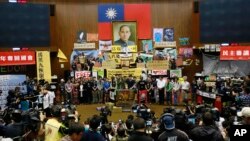With less than a month until voters head to the polls across Taiwan, presidential and legislative candidates are gearing up for the final weeks of campaigning. They are engaging with voters at local markets, waving at busy commuters at major intersections in the morning, and going live on social media platforms to interact with supporters.
While hundreds of candidates are vying for a chance to become legislators, a growing number of young candidates under the age of 40 are standing out in this year’s election. Many of them are participants from the student-led Sunflower Movement in 2014, which occupied the chamber of Taiwan’s legislative yuan for 23 days and forced the government to shelve a controversial trade and service agreement with China.
For some of them, running in the legislative election is an opportunity to showcase the experience they have accumulated over the last nine years and prepare themselves for the next phase of their political careers.
“Nine years ago, we were all activists with no political experience, but over the last nine years, we’ve all accumulated some experiences in politics and made some achievements in our respective districts,” Miao Po-ya, a 36-year-old Taipei City councilor who is running as a legislative candidate in Taipei City, told VOA.
In September, Miao and five other young legislative candidates formed an alliance called “The Generation” and vowed to prioritize issues the younger generation is most concerned about.
Since they have either become local city councilors or run in multiple elections since 2018, Miao said these experiences have strengthened their minds and prepared them to face the biggest challenge in their young political careers.
“The six of us come together because we want to prioritize issues that will benefit young people in Taiwan, and we hope to become a force that could influence public policy on behalf of the younger generation,” she said in an interview in Taipei.
Some analysts say it’s important for young legislative candidates to band together and try to attract more public attention.
“Increasing visibility is probably an important consideration for them to form the alliance and one of the key strategies for them to achieve the goal is to attract more media coverage,” Chen Fang-yu, an expert on Taiwan politics at Soochow University in Taiwan, told VOA by phone.
In addition, Chen said members of “The Generation” can also try to increase the chances of engaging with young voters who don’t usually focus on politics by holding unconventional campaign rallies that include musical concerts or live talk shows with celebrities.
“Young people usually don’t like to attend traditional campaign rallies where politicians go up to the stage and repeat their policy platforms,” he said.
“But when younger legislative candidates turn campaign rallies into performances, many people who normally don’t pay much attention to politics may be attracted by the performances and decide to attend the campaign rallies,” Chen added.
Amplifying younger perspectives
In addition to preparing for the next phase of their political careers, some young candidates say running in elections enhances the prospect of having voices representing the younger generation in Taiwan’s Legislative Yuan.
“The reason why the turnout rate among young people has long been low is because they think no one speaks for them in the Legislative Yuan,” Alfred Lin, a 33-year-old political advisor turned legislative candidate from Taiwan’s main opposition party Kuomintang (KMT), told VOA in an interview in Taichung — the second largest city in Taiwan.
In his view, a lot of young politicians realized after the Sunflower Movement in 2014 that the only way to initiate political changes in Taiwan was by getting into politics.
“Many young politicians decided to run in the election because they believe it’s important to have legislators who can represent the younger generation,” he said.
Apart from amplifying the younger generation’s perspectives in Taiwan’s top political arena, some young politicians say one of their missions is to challenge some longstanding bureaucratic practices that have plagued Taiwan’s political institutions.
“When I joined the Miaoli County Council with other newly elected young councilors in 2018, we worked together and tried to introduce new practices into the council, which sometimes challenge the political culture within the county council,” Tseng Wen-hsueh, a 36-year-old independent legislative candidate in Miaoli County, told VOA by phone.
According to Tseng, these new practices pushed the Miaoli County Council to start reviewing the county’s annual budget thoroughly and older councilors also became more receptive to proposals that might introduce fundamental changes to the county.
Chen from Soochow University said one of the effects of having more young politicians running in elections is to encourage more young people to come out and vote in elections. In previous presidential elections, the turnout rates among young people have been consistently lower than other age groups.
“It’s possible for young voters to support young politicians in elections because intuitively, young voters may think they are more similar,” he told VOA. “When young voters think there is a candidate that could represent them, their willingness to vote in the election will increase.”
As dissatisfaction with the political establishment grows among young voters in Taiwan, Lin from the KMT said it’s important for them to come out and vote for candidates who they think focus on things and values that they care about.
“Some young voters may think nothing can be changed through voting, and these thoughts may turn into a vicious cycle,” he told VOA. “If you come out and vote for a candidate who holds similar values, there may be someone who represents your voices in politics, and gradually, the things and values you care about might become policies.”






